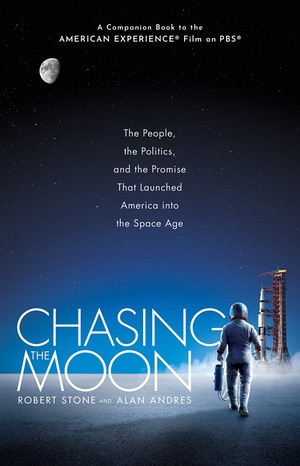Review: Chasing the Moonby Jeff Foust
|
| Clarke’s interest in spaceflight started with a book he got as a teen titled The Conquest of Space by David Lasser, whose career was primarily spent in organized labor and had a bid to get a government job derailed in the 1940s when a congressman described him as a “crackpot with mental delusions that we can travel to the Moon!” |
If, though, you’re curious about the people who made Apollo possible, this is an engaging book. Chasing the Moon focuses some attention, as you would expect, on key individuals in the program, from Wernher von Braun and NASA administrator James Webb to the Apollo 11 astronauts. However, the book also devotes attention to some of the lesser known, more tangential figures who were either involved in Apollo or influenced it in some way: science fiction author Arthur C. Clarke, NASA public affairs head Julian Scheer, and Poppy Northcutt, the first woman to work in Mission Control during Apollo.
The book doesn’t offer much in the way of revelations about the program or the people involved, at least for those people who have read their fair share of Apollo histories. However, the book does help establish the human dimension of what has largely been described as a political and technical achievement. Clarke, for example, had his interest in spaceflight started by a book he got as a teen titled The Conquest of Space by David Lasser, whose career was primarily spent in organized labor and had a bid to get a government job derailed in the 1940s when a congressman described him as a “crackpot with mental delusions that we can travel to the Moon!” Scheer, who joined NASA after working as a newspaper reporter who covered the civil rights movement, helped administrator Thomas Paine defuse a demonstration by civil rights activists outside the gates of the Kennedy Space Center the day before Apollo 11’s liftoff; he also has a second career as a children’s book author.
The book, of course, touches upon the bigger, better known issues and controversies as well, such as von Braun’s Nazi ties and the political debates about the race to the Moon, including those that came after the Apollo 1 disaster in 1967. The emphasis there, as with other aspects of the book, is not the rockets and spacecraft, or the missions they flew, but rather the people who made it possible. That makes this book—and, presumably, the documentary that it supports—a useful counterpart to the other histories, including those published this year, that focused primarily on the big names and the big rockets.
Note: we are temporarily moderating all comments subcommitted to deal with a surge in spam.
